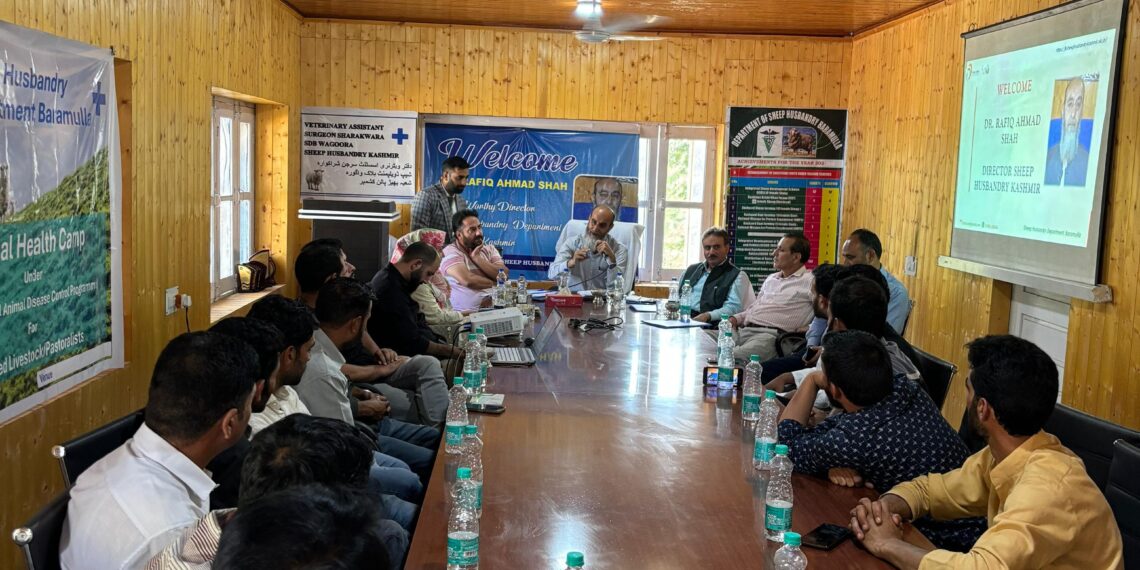Baramulla, 25 Aug: In a historic first, Dr. Rafiq Ahmad Shah, Director of Sheep Husbandry Kashmir, embarked on a landmark visit to Baramulla, presiding over a pivotal event at the Sheep Husbandry Complex in Shrakwara.
Accompanied by Deputy Director Central, Dr. Mohd Amin Dar, and Deputy Director Feed & Fodder, Mr. Latief Ahmad, the visit was organized by the District Sheep Husbandry Office, Baramulla.
Dr. Shah’s visit began with a tour of the Angora Rabbit Farm in Wusan, where he conducted a thorough inspection of livestock sheds and agricultural operations.
He received a detailed briefing from the Assistant Director of the Rabbit Farm, who updated him on the farm’s activities. Dr. Shah issued immediate directives to enhance public awareness and promote rabbitry through both print and social media channels.
At the Sheep Husbandry Complex in Shrakwara, Dr. Shah was welcomed by the Dr Showkat Ahangar, DSHO Baramulla and participated in the planting of a tree sapling in the complex’s lawn.
The event drew a broad audience, including Assistant Directors from Rabbit Farm Wusan and Sheep Breeding Farm (SBF) Hardshiva, the SDO Uri, veterinarians from across the district, officials from Sheep Extension Centers, Farmer Producer Organization (FPO) members, and progressive breeders.
Dr. Irfan Magray, VAS Zethan, hosted the event, with Dr. Ishfaq Dhobi, VAS Shrakwara, offering a warm welcome to the dignitaries.
Dr. Dhobi praised Dr. Shah for this groundbreaking visit, lauding his contributions as well as the exceptional work of the Deputy Director Central. He also commended Dr. Showkat Ahangar, DSHO Baramulla, for the significant advancements achieved under his leadership.
The program featured an in-depth discussion with FPO members and progressive breeders, who expressed their appreciation for the Sheep Husbandry Department’s support and training initiatives.
Key requests included additional training and exposure to successful practices outside Kashmir, the establishment of a sub-district hospital in Wagoora, and the conversion of the ram feeding center into a modern training facility.
Dr. Shah listened attentively to these requests and assured that viable demands would be addressed promptly. He also committed to exploring ways to provide quality rams directly to breeders.
During subsequent interactions with field officials, several critical issues were raised, including cold chain maintenance for vaccinations, safe dwelling equipment for highland pastures, risk allowances for employees, duty rosters, working hours, and timely vaccine delivery. Dr. Shah assured that action on these concerns was already underway and that every effort would be made to resolve them.
One of the most important discussion was between the young, dynamic veterinary assistant surgeons and the Director. Dr. Showkat Ahangar highlighted the district’s achievements and expressed gratitude for the Director’s visit.
On behalf of the district veterinarians, Dr. Ishfaq Dhobi presented a comprehensive list of requirements, including the need for a new VAS Headquarters building, a referral district hospital with advanced facilities, wild animal chase-away guns, canvas tents, survival gear, surgical supplies, mini-labs at VAS centers, infrastructure upgrades, bikes for hilly terrains, and the digitization of centers with laptops, printers, and internet facilities.
The rationalization of SDO and VAS posts was also requested. Dr. Shah acknowledged the validity of these demands and committed to prioritizing them. He directed the immediate submission of a prototype for the VAS building and requested a list of survival gear needs.
At the end of the day, Dr. Nuzhat Wali, AD Hardishiwa, highlighted several issues faced by the farm. For making the farm sustainable and profitable, Dr. Shah took immediate cognizance of a few issues and assured her that all other issues would be sorted soon.
He also assured that he would soon visit the SDF Hardishiwa. The event concluded with a vote of thanks from Dr. Irfan and a ceremony honoring outstanding veterinarians and paravets.


